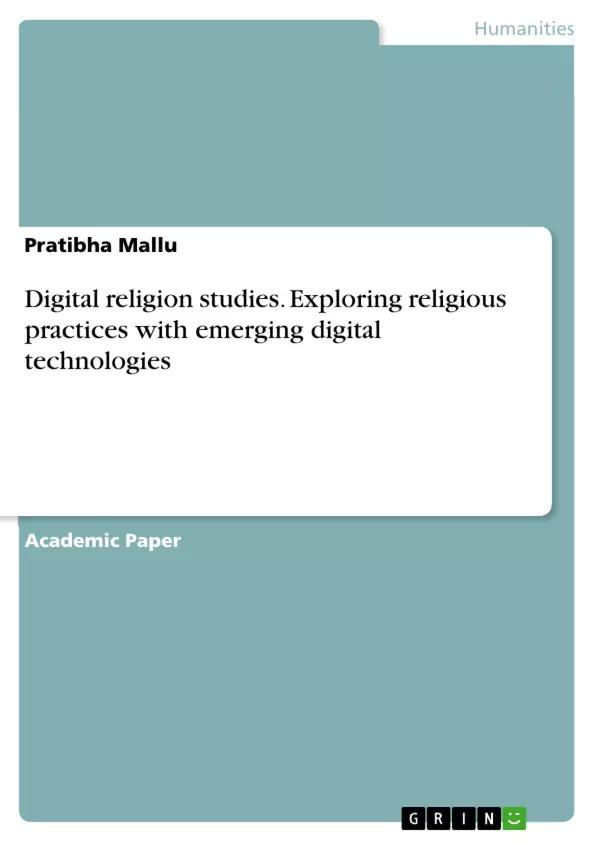A study has been conducted to collect the opinion of digital religious teachers and students to find out the outreach of digital technologies for various temple services, rituals and extension services. Data has been analysed qualitatively and quantitatively. The results showed the interest, acceptance and amalgamation of digital technology into religion of candidates and teachers and the concerned literature confirmed the same.
The participants in this study belong to different religions of the World. Digital religion is religion on digital media and also an amalgamation of all of the societal and cultural aspects of religion with all segments of the digital society. Digital religion studies analyses and discusses how different religious practices incorporated, absorbed and acknowledged digital technology into their religious lives. The main attention of the present article is, to explore religious practices with emerging digital technologies in contemporary culture. The present article provides an outline of the development of digital religion studies and some of the practical approaches usually applied in this area. Societal and cultural influence on digital technology and vice versa has been looked within the arena of digital and religious studies. Though digital religion study is an upcoming area, it is a unique research area with unfolding of extraordinary results.
Inhaltsverzeichnis (Table of Contents)
- Abstract
- Introduction
- The concept of Digital Religion
- Methodology
- Profiles of digital religious teachers and candidates
- Analysis of results
- Discussion
- Conclusion
- References
Zielsetzung und Themenschwerpunkte (Objectives and Key Themes)
This study examines the influence of digital technologies on religious practices, particularly focusing on the perspectives of both digital religious teachers and students. The research analyzes the use of digital tools for temple services, rituals, and extension services, aiming to understand the integration of technology into religious life.
- The impact of digital technologies on religious practices.
- The integration of digital tools in temple services, rituals, and extension services.
- The perspectives of digital religious teachers and students on technology's role in religion.
- The emerging field of digital religion studies.
- The influence of societal and cultural factors on digital technology and religion.
Zusammenfassung der Kapitel (Chapter Summaries)
The introduction explores the innovative reality presented by internet technology and its potential impact on religion. It highlights the increasing digitalization of religious practices and the availability of religious programming across various media platforms. The chapter discusses the blending of modern society with contemporary religious beliefs and practices, defining "digital religion" as a merging of societal and cultural components of religion with digital society.
The chapter on the concept of digital religion further delves into how religious leaders utilize social media platforms to communicate with followers, promote their work, and share information about upcoming events. The chapter also examines the adaptation of religious rituals in online environments, such as the online ritual of bay'ah in Sufism, and explores the potential for modifications in various religious practices.
The chapter on methodology outlines the study's approach to collecting and analyzing data, exploring the perspectives of both digital religious teachers and students. The study aims to understand the acceptance and integration of digital technology into religious life. The chapter also discusses the broader context of digital religion studies and the societal and cultural influences on digital technology and vice versa.
The chapter on profiles of digital religious teachers and candidates presents an in-depth analysis of the participants in the study, highlighting their diverse religious backgrounds and experiences with digital technologies. The chapter examines the various ways in which digital technologies have impacted their religious practices and beliefs.
Schlüsselwörter (Keywords)
The key terms and concepts explored in this study include digital religion, religious practices, online rituals, application of digital technology, digital religious teachers, digital religious students, societal and cultural influences, and the influence of digital technology on religion. The study also examines the impact of digital technologies on temple services, rituals, and extension services, exploring the integration of technology into religious life across various religious traditions.
- Quote paper
- Dr. Pratibha Mallu (Author), 2021, Digital religion studies. Exploring religious practices with emerging digital technologies, Munich, GRIN Verlag, https://www.grin.com/document/1011231



